
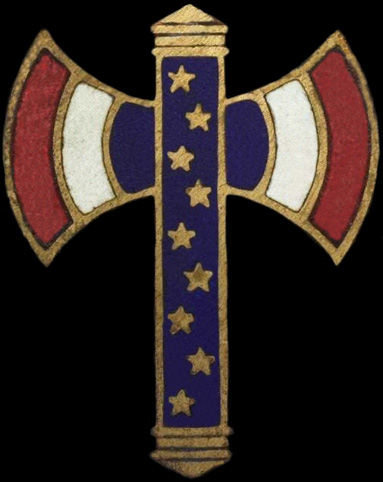

Interview with Lisette Garnier, a French civilian who lived through the war and subsequent German occupation. Bourges, France, 1989.
[Translator: Charlotte Schmitz (Germany)]
.
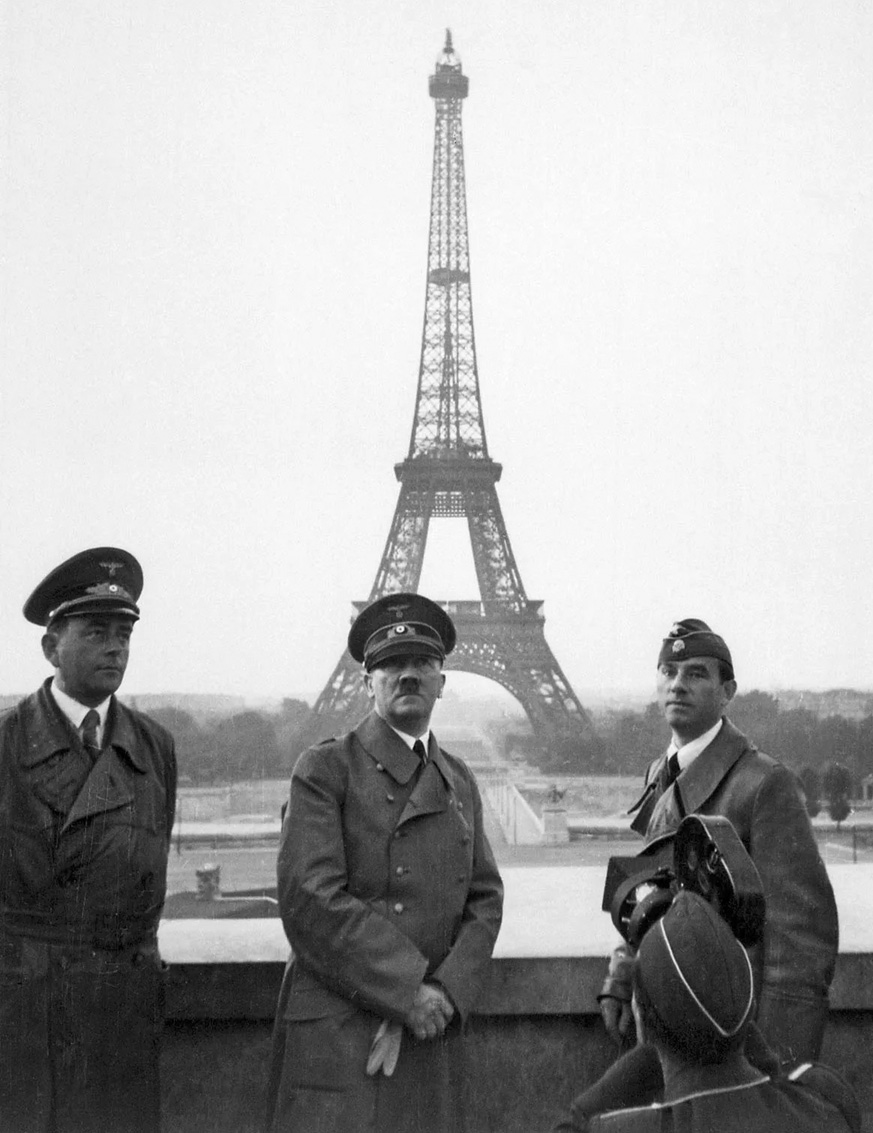
[Above: Adolf Hitler with architect Albert Speer (left) and photographer at the Eiffel Tower, June 1940. After the fall of France Hitler had redeemed Germany from the cruel and dishonorable Versailles Treaty, saying 'Now I can die fulfilled...' Click to enlarge.]
*For perspective, after France's military defeat against Germany, it was agreed upon that half of the country would be
under German occupation until the end of the war, and the other half would be governed by the French themselves.
Yes, the Germans were extremely generous with their terms.
This government was based in the French town of Vichy. The subject of this interview,
Lisette, was in the city of Bourges, in occupied central France.
It is nice to sit down with you; you mentioned you lived during the war and the German occupation. Can you tell me what it was like for you to experience the German invasion?
Lisette: Certainly, I am happy to share this with you as it is nice to see young people wanting to know about our life and history. As you know the German invasion happened in May of 1940. I was a 10 year old school girl living here in Bourges.
We had been at war with Germany since September of the year 1939; France declared war to help Poland. I still remember those days. I was young and it was exciting for the youngsters. For the adults, who lived through the first war, they all looked worried. We still had a few who lived through the 1870 war as well, but they were quite old.
The adults would tell us it would be bad if the Germans came as France would cease to exist. They had stories in the papers of atrocities that we were reminded of from the first war, and in Poland. I remember my father reading the paper to us and talking about how bad a war would be if it came to us.
I saw the mobilizations where local units and militias were formed and started training here. We lived by the river and would sometimes see the soldiers doing war games nearby. As kids we would always be outside playing and very curious as to what the soldiers and adults were doing.
We would see the planes come into the airport as well as they had to come in for a landing by us. I remember hearing one crashed on the outskirts and the older kids went out to see it. The Germans dropped leaflets one day that came down and we found one and kept it secret so the adults did not know we had it. It told the people that Germany did not want to fight us but France declared war.
I remember feeling like we could get into trouble for having this so we hid it. You were supposed to burn or turn in any enemy propaganda. That spring we saw more activity through our city, long trains of military equipment and soldiers. They seemed to all be going north.
We learned of the attack from people yelling in the streets that the Germans had attacked. I remember it being very scary and my father came home from work. I heard him speaking to mother about how we would just stay put as we could get caught up in the shooting if we leave.
Now remember I was a young girl back then so it was very exciting to me to see everything happen. I remember the black soldiers came though here on their way to the war, and I remember thinking how odd it was to have them fight for us. I had no opinion really; they seemed to be nice, although some looked like disheveled devils.
The French army came through also, there was some strange tank or armored car I remember that they left abandoned in the street, as it broke down or something happened. We children were allowed outside as there was no fighting by us. We could swear we heard fighting in the distance however, we would talk about how the war was being won, and of course we were the experts at our ages. I did get to see the French soldiers retreating through the streets. They looked sad and disorganized, some of the people on our street came out to offer them water or wine. I remember the mood was very grim back then; life was full of uncertainty for us all.
We started to see German planes, or at least I think they were German, fly over and drop leaflets urging peace, we took a leaflet from the street and hid it. We did not know if you could get into trouble for having it. It told the population that Germany was asking for peace with France, and that no one should shoot at German soldiers, or they in turn would be shot.
To us youngsters it all seemed so serious and out of our understanding. I was not a little girl any more so I went to my father and asked him to explain what was happening. He told me that the Germans had broken through and France was beaten. He said the Germans would be here soon to occupy us.
I made sure to be outside as much as I could, school was closed as were most all businesses so we had free time to wait and see. I think it was in either late May or early June that the Germans came into our city. There was some fighting I remember, a few French units tried to fight.
There was artillery hits in the city, and the Germans attacked the train yard. Of course there were the curious ones who ventured out to see for themselves what was happening. There was a French column of vehicles that came close to us, and one of the smaller tanks or something broke down and was abandoned, as I said.
I remember after the fighting we went to go play on it. There were live shells I remember and a policeman warned us to get away. The soldiers all had left the city, and I saw white sheets out of some windows, the town was very quiet. Some of the people fled away, my parents were told to stay indoors and not to go on the roads as they were clogged.
The Germans arrived and strangely there was nothing I remember about it. They came in and secured some big buildings and then left. It was not much longer that France surrendered and the war was ended. More Germans came into Bourges and settled into occupation.
Can you tell me what it was like living under German occupation? Did you ever see any Germans behaving badly towards the French people?
Lisette: Oh that is a lot to speak about my dear. I have to tell you that under the Germans it was not as bad as you may think. I remember my parents being ashamed France fell, and fearing what the Germans would do to us. The police called all the people out of their homes by blocks.
They handed out flyers telling that they meant no harm, and would help with any war damage. I remember seeing Germans repairing the roads and there were some homes that were damaged. My father was a handyman and they put him to work, he was paid very well.
This made a good impression on him. For Christmas he was able to buy a very fat goose for us and we were suddenly doing better than before. He was given lots of work which kept him busy, but he seemed happy with the money he was being paid.
Most French do not like the Germans, based on our prior history, but I was so young I did not have any preconceptions of them. I can tell you the soldiers I saw were very nice and went out of their way to be polite. I can give you some examples of what I saw.
I was with mother once walking to the stores when a woman who was pushing her pram broke a wheel, she was pregnant I remember so she was struggling to keep the pram from tipping on its side. I saw German soldiers who were enjoying themselves at a food stand all run over to help her.
They picked up the child and kept it warm, while the others worked on the pram right there. We stopped to watch, and one of the soldiers spoke French, they told her she could bring the pram by their barracks and they would permanently fix the wheel, as what they did would only be a quick fix.
That impressed me to see them with such charity. Another time there was a child missing and was feared drowned. The police asked all able-bodied people to help search, and I saw several German soldiers helping. It was a soldier who found the child in the woods, they snuck away when no one was watching and became lost.
My personal experiences are many, and I have nothing bad to report. We would see the soldiers on leave often. You would see them out walking, smoking at a cafe, or sightseeing. It never really seemed like there was a war.
Once, I was playing with the neighborhood kids, as we always did, and I was running in the woods along the river. I stumbled on a group of soldiers fishing, and they called me over and loaded me up with chocolate bars.
One spoke perfect French and told me to go share with my friends. That was a day I became very popular with everyone as we always liked sweets. All through the war the soldiers always seemed to behave with no issues I knew of. I know it is said they did some bad things in other areas but here they did not.
I would see them drink with the men; many were fathers of my friends. Once we were spying on a drinking party and the Germans were singing the La Marseillaise [the national anthem of France] with them. That was very odd to us to see our enemies singing our anthem with great cheer.
My class was picked to go to a cemetery and to clean up old graves, and sadly some new ones from fallen French and English soldiers. The Germans were there too as some of their men were buried close by and I saw them pay respects to the soldiers we cared for.
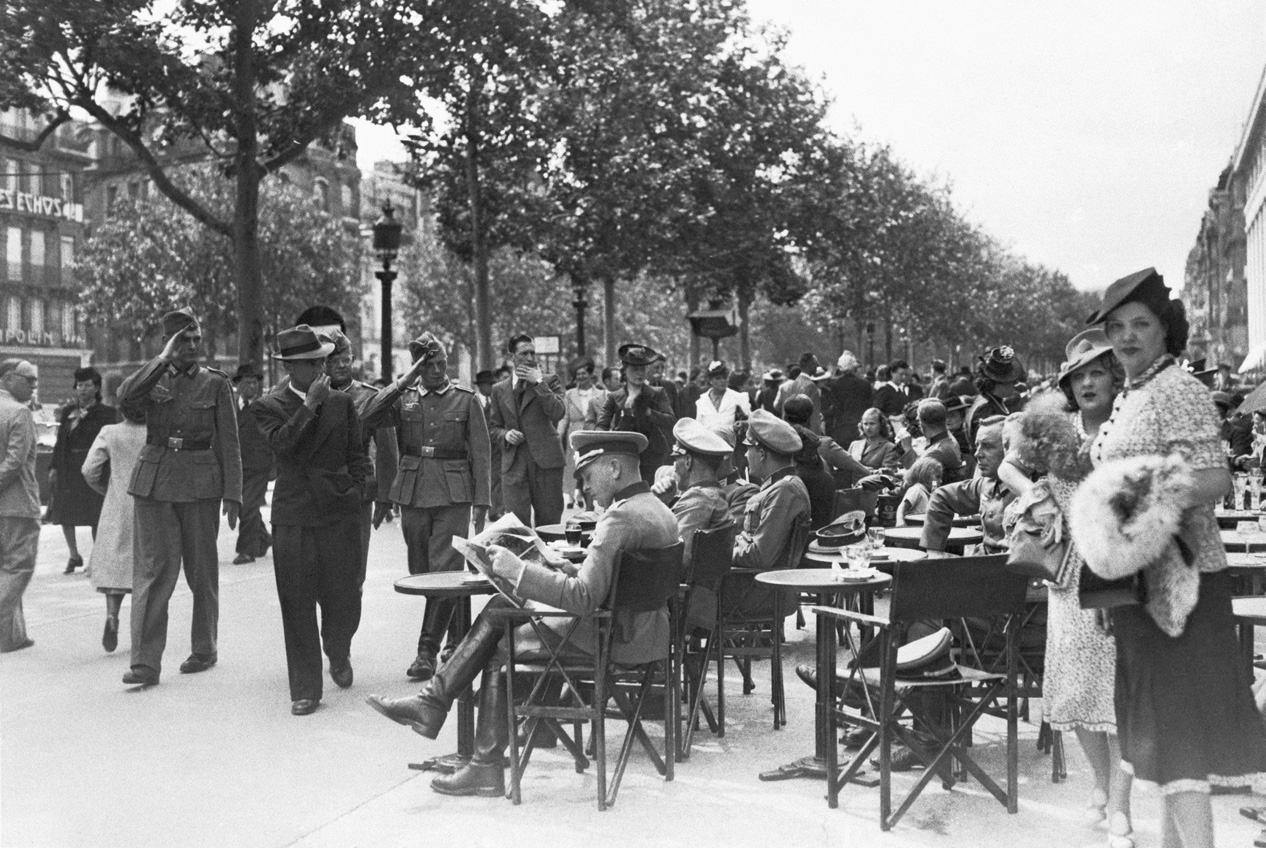
[Above: Paris during the occupation. German soldiers walk the streets and mingle calmly with French civilians. Click to enlarge.]
Were you allowed to go to school? I have read that Germans closed all schools in the occupied areas to keep children from being educated.
Lisette: Oh heavens what have you been learning? That is so very untrue to say. Sadly for us our schools reopened very quickly so we received very little break time from the war. You see Germany made peace with France, and did not even occupy the whole country. They allowed [Philippe] Petain to be in charge.
We were told in class that a new France was being born out of the old, one that put Europe first and to give everyone freedom and bread. Of course I was so young I did not understand it all. Our leader was Petain and we would start our mornings doing a pledge to the flag.
We would also sing a song for Petain; we would tell him we are coming to help in building this dream. It was all about France, and making a healthy new way of life for us all, they said. I am told the curriculum was changed a bit, and any Jewish or communist teachers were dismissed.
We had a new teacher in our school who had been a member of a French political party that the Germans agreed with. She was very well liked I remember and captured everyone's respect when she allowed us to start having class outside. I remember an assembly where she said we need to be out enjoying nature and not always cooped up in a stuffy room.
We learned her parents had both died during the flu pandemic after the first war, and she was adopted by a family who raised her.
She taught a class on hygiene for us girls, and how we must be clean in body, mind and spirit, she always reminded us of this. Because so many people died from this flu, and we learned later about typhus, that we were told to very clean. These diseases hit again right after the war. I remember we had to be very careful around all those who came from the east and asked for asylum. They had typhus and it could not be spread or it would end you.
We even met a German group of girls from the Hitler people and we learned their dances and exercise routines, and taught them some of ours, they stayed for a month here.
We ended with having a competition where we formed teams and did relay races and other activities. We saw we were all the same and had the same interests.
My best friend met a girl from Essen [Germany] who spoke perfect French; she exchanged addresses so they could write to each other. They both liked rabbits so they wanted to share pictures. She stopped writing in 1944 and we learned she died in an air attack that year.
There seemed to be very good cooperation between the two countries, as many French went to Germany to learn skills or to work. We had a cousin who went to the border to work in a mill and would talk about how the old animosity between the two countries had seemed to disappear.
Did you ever see anyone who the Germans took away or deported? I have read they went after Jews and others.
Lisette: I do not know. I never saw or heard about anything. All that I remember was there was a man who lived on our block that the parents would warn us not to go by his home or speak to him. He owned some club in the big city, Paris. It was something bad it seemed like.
They acted as if he was an evil man who must be watched around children. When the Germans came he disappeared and his home was emptied I remember. They did put up warnings saying that if anyone hurt, attacked, or did anything bad to German soldiers or property they could be arrested and punished.
I am sure some people ran afoul of them, I just did not see anything myself. I can tell you it was funny to me after the Allies came in 1944, everyone was a part of the resistance. I mean everyone. It was somewhat funny to see how they would proclaim they helped resist and fight the Germans, but in reality were accepting and passive.
I saw none of this resistance, to me it appeared the people got along very well with the Germans, let me tell you a dirty story, you will blush at this. I was taking a walk along the river one summer, it was in 1943 I believe, and I came across a German soldier and his French girlfriend.
He had his hand inside her dress and was doing something he should not have been doing as they were not married. When I came upon them they quickly stopped and fixed themselves. The girl yelled at me to not sneak up on people, I replied I was sorry and that I had not seen them.
I left with a smirk knowing they were up to no good. Many French girls took up with German soldiers yet after the war publicly denied any involvement. Some I know were beaten, shaved and even killed for their relationships based on what area they lived in. The south seemed to have a good amount of communists who settled there.
I know I thought of myself as lucky to be a child during this time so that I was not involved with it one way or the other.
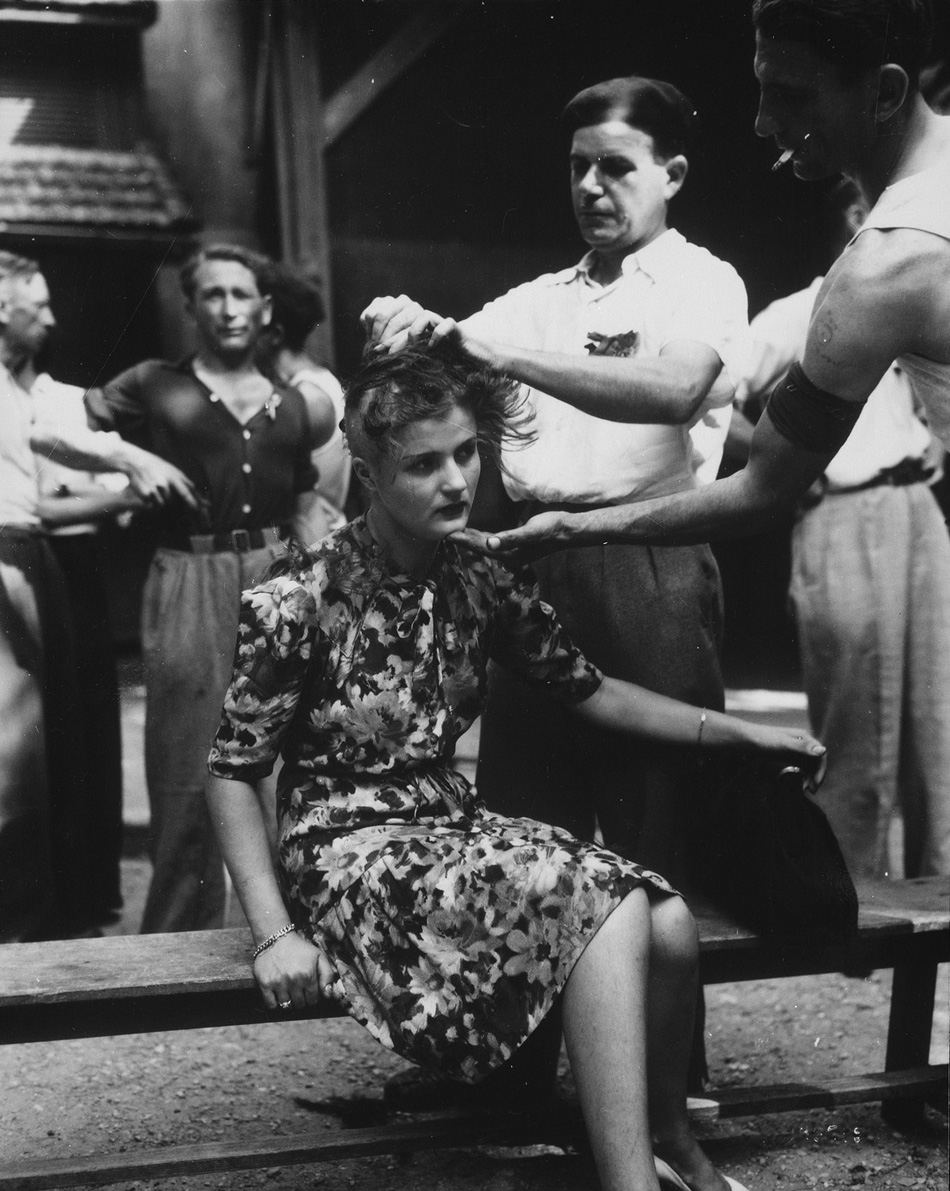
[Above: Thousands of women were beaten, shaved, sexually assaulted and worse by communist mobs after the war for having relations with German men. Here some real 'tough' guys are forcing a pretty young French girl to hold her head up for the camera as they shave her head. Real brave guys, I wonder why they didn't do this when the Germans were around? Cowards.]
Germany is accused of stealing works of art from the countries they occupied; did you ever see anything like this happening?
Lisette: Again, no I never saw anything like that. I can tell you the Allies did bomb our city leading up to the landings. Because of this my father said French authorities were removing art and cultural items to be kept safe. They were put into trucks and taken to the country for safe keeping.
I never saw German soldiers go in and take things, as I said they seemed to behave with no problems. I can tell you that your soldiers [interviewer is American] seem to have stolen a lot of art from France. There are sometimes stories in the papers where a lost painting was found in America and being reunited with its owner.
I have to chuckle as the story is always the same, the Germans looted the piece and an American found it and brought it home in good faith. They never seem to want anyone to believe the Americans were capable of looting as well.
What about the black soldiers who fought for France, did you see any more of them after the Germans came or was anything said about them?
Lisette: I can only say that those soldiers were not French, they were not of French blood, and so had no obligation to fight for France. The Germans seemed to let them all go home to Africa as far as I know. I say that as during our family travels to the south for vacations I never saw any of them.
That means nothing I suppose, but if they were allowed to stay or were prisoners, I would think one would see them out working. I know the French prisoners the Germans kept stayed in France mostly and were used to help repair bomb damage or help with the harvest.
I know many of our soldiers were allowed to come home, there were welcome parties held when this happened. I never saw any of the black soldiers in these groups. The papers said all non-Europeans had been made to return to their homes abroad.
In school they did teach us about race and how important it was to keep your race together. I found these to be boring at the time, but I am growing concerned at what I see today, I fear the Germans might have seen something dangerous that France does not.
We were taught that there are only racial problems when the races are thrown together and that is why God separated them. We did learn some anti-Jewish lessons which were hotly contested after the 'liberation'. The Germans wanted us to believe that the Jews worked to try to destroy the races by making them live together.
I remember the people who came with the Allies burned all the books they did not agree with in the school yard. They then brought in teachers who made sure we knew that everything the schools taught under Petain was all lies and we must not believe them.
It was so silly to me, where I was older and more alert, I could see they really wanted us to unlearn what to me seemed like a reasonable idea, and common sense.
They went so far as to challenge us with questions regarding why Jews were not part of this at all and it was lies that they were powerful. We had to give satisfactory answers or we would get more homework where we had to study the books they handed out.
As I said I was bored with it and we never really paid attention to all that political talk, on both sides, there was too much else to be interested in for young ones.
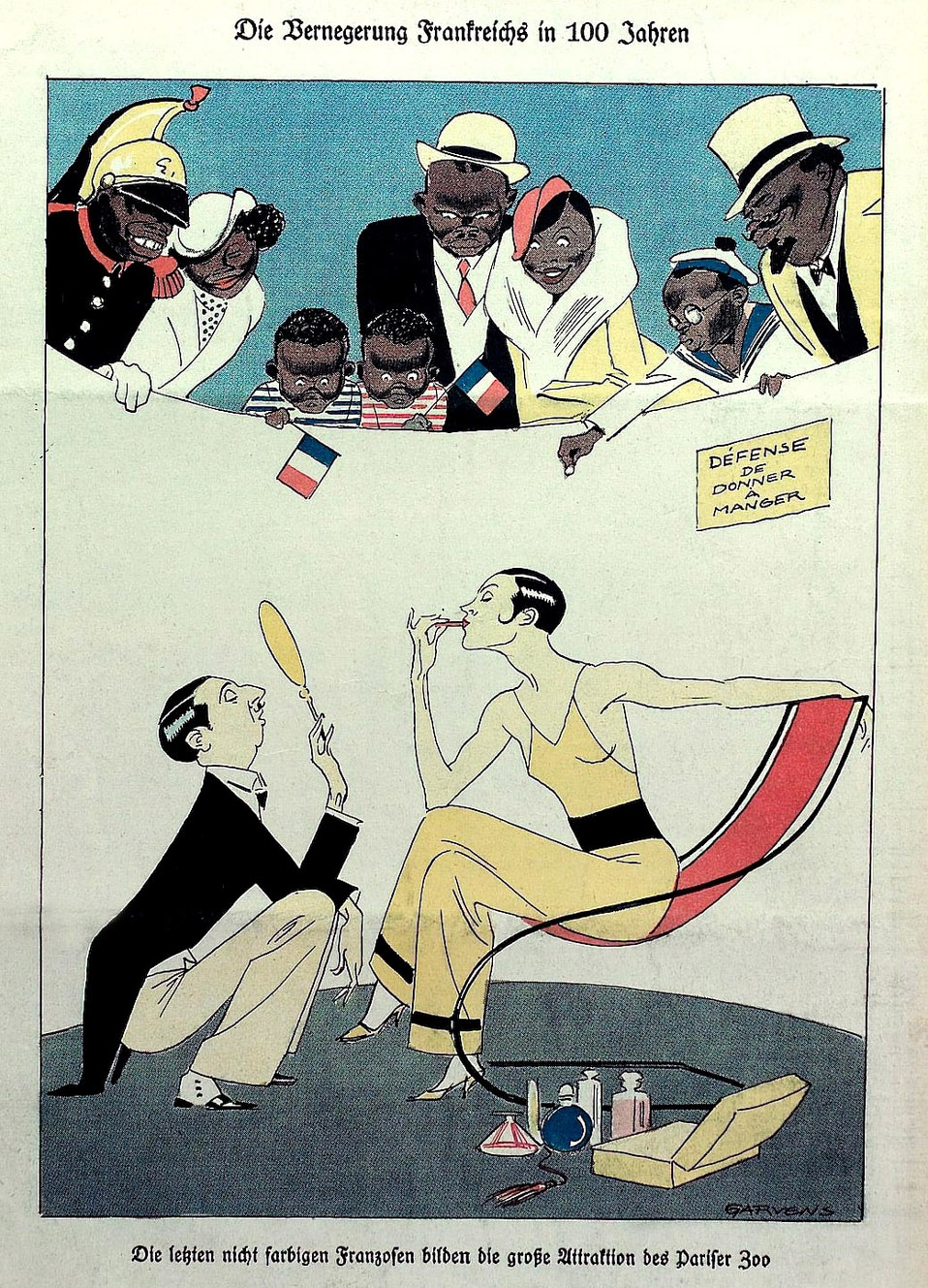
[Above: This says: 'The last colorless French are the main attraction of the Paris Zoo.' From the German magazine Kladderadatsch, 1932.
This was predicting what France would be like in 100 years. It was spot on wasn't it? Unfortunately the victorious Allies did the same to Germany, forcing immigration and the mixing of races.]
*It's important to understand that many French people did NOT welcome the Allied invasion. Many French saw the Germans as liberators and protectors against the threat of communism. The thousands and thousands of French who volunteered to fight beside the Germans on the Eastern Front is a testament to this. There was a also a great deal of hatred and animosity between the British and the French people. When the Allied invasion finally happened the French learned firsthand of the extreme brutality and violence of the Allies, who ruthlessly leveled cities and towns throughout France and killed thousands of French civilians. Here are some quotes from the so-called liberators themselves:
'The French population did not seem in any way pleased to see us arrive as a victorious army to liberate France. They had been quite content as they were and we were bringing war and desolation to their country.'
-Sir Alan Brooke, British Army Chief of Staff
'I saw absolutely no evidence of German abuse of the population... The attitude of the French was sobering indeed. Instead of bursting with enthusiasm they seemed not only indifferent but sullen. There was considerable cause for wondering whether these people wished to be "liberated."'
-John Eisenhower, General Dwight Eisenhower's son
'I am informed the Germans did not loot either residences, stores, or museums. In fact the people claimed that they were meticulously treated by the Army of Occupation.'
-General LeRoy Lutes, US Army
'I see SHAEF communiqué said yesterday that the town had been liberated. Actually, it has been completely flattened and there is hardly a house intact; all the civilians have fled. It is a queer sort of liberation.'
-Field Marshall Montgomery, referring to the French town of Carentan
'Most Frenchmen speak of the correctness of the German Army's behavior. They seem particularly impressed that German soldiers were shot for incivility to women and compare this with the American troops' bad behavior toward women.'
-Captain B. H. Liddell Hart
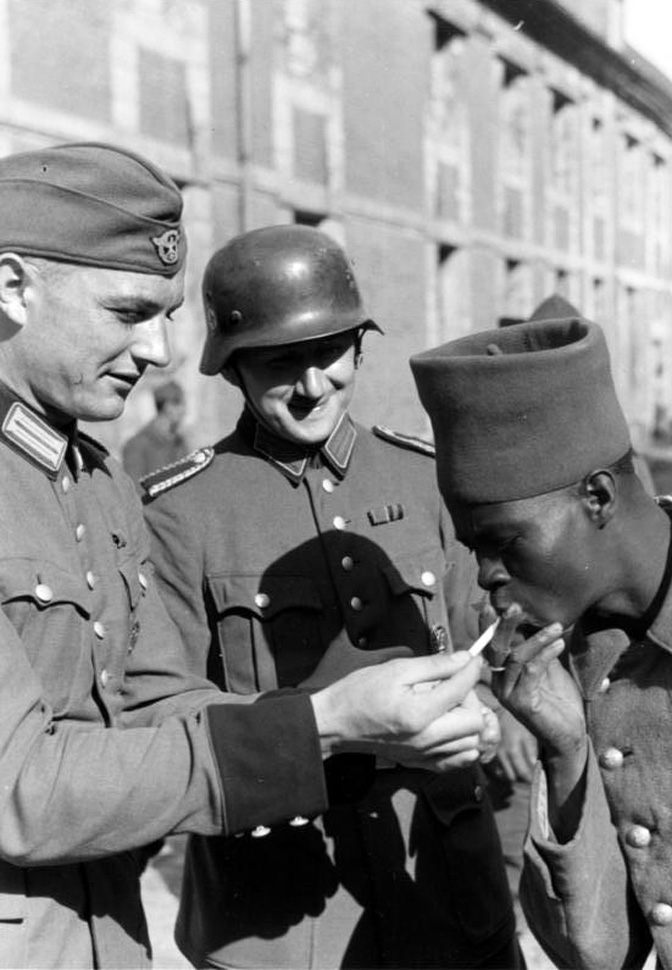
[Above: A German military police officer lights the cigarette of a French colonial prisoner in German captivity, 1940. These poor Africans were brought across the world to fight in a war they didn't belong in. Many of them were used by the corrupt French authorities as cannon fodder.]
Back to Interviews









